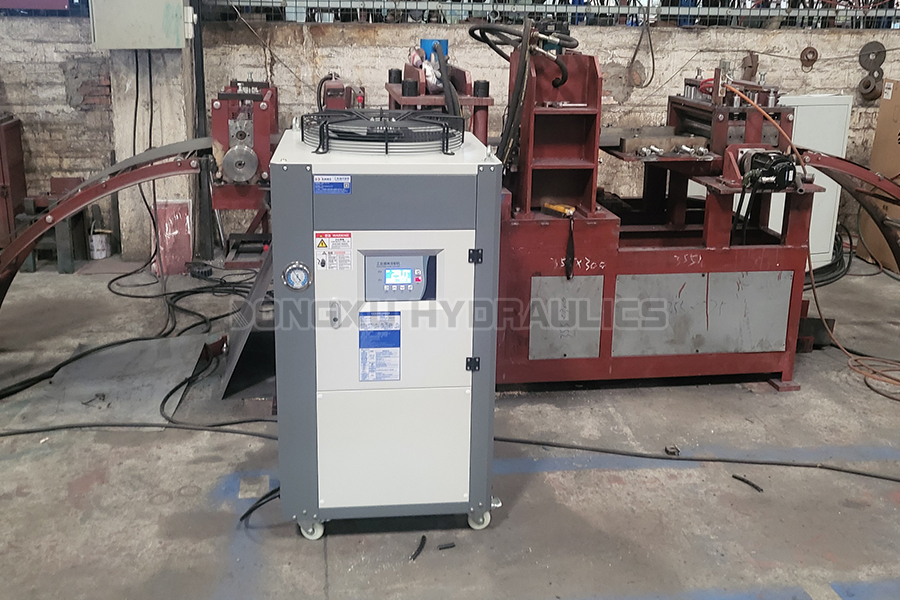The refrigeration system itself
The nature and charge of refrigerant: different refrigerants have different refrigeration performance, such as R22, R410A and so on. Moreover, the refrigerant charge should be appropriate, too much or too little will affect the refrigeration effect. Charge too little, the evaporator refrigerant evaporation is incomplete, the cooling capacity is insufficient; charge too much, will make the compressor load increase, will also reduce the refrigeration efficiency.
Compressor performance: the compressor is the core component of the refrigeration system, its power, efficiency and compression ratio and other performance parameters directly affect the refrigeration effect. The compressor with high power and high efficiency can compress the refrigerant more quickly and improve the efficiency of the refrigeration cycle, thus realizing better refrigeration effect.
Evaporator and condenser heat transfer capacity: evaporator and condenser structural design, material and surface area and other factors determine their heat transfer capacity. For example, the use of high-efficiency heat transfer tubes, increase the heat transfer area, optimize the distribution of refrigerant in the evaporator, etc., can improve the heat transfer effect of the evaporator, so that the refrigerant can more fully absorb the heat of the oil. The heat dissipation effect of the condenser is also very critical, if the heat dissipation is poor, it will lead to the condensation temperature and pressure increase, so that the performance of the refrigeration system will bereduced.
OIL CIRCULATION SYSTEM
Flow rate and flow rate of oil: The flow rate and flow rate of oil affect the efficiency of heat exchange between oil and refrigerant. Proper oil flow and flow rate can ensure that the oil is in full contact with the refrigerant in the evaporator, so that the heat in the oil can be transferred to the refrigerant in time. If the oil flow rate is too small or too slow, it will lead to the oil in the evaporator to stay too long, the oil temperature drop too low, and may even appear icing phenomenon; while the oil flow rate is too large or flow rate is too fast, it will make the oil and refrigerant heat exchange is not sufficient, the refrigeration effect will also be affected.
The nature of the oil: the specific heat capacity of the oil, viscosity and other properties of the refrigeration effect has a certain impact. Oil with large specific heat capacity can absorb more heat, which is conducive to improving the refrigeration effect. Oil with higher viscosity will produce greater resistance in the circulation process, affecting the flow and flow rate of oil, which in turn affects the refrigeration effect.
Cooling medium
Temperature and flow rate of cooling medium: For water-cooled oil coolers, the temperature and flow rate of cooling water are important factors affecting the cooling effect. The lower the cooling water temperature and the higher the flow rate, the better the cooling effect of the condenser, which can make the refrigerant more fully cooled and condensed in the condenser, reduce the condensing temperature and pressure, and improve the performance of the refrigeration system. For air-cooled oil coolers, the temperature and flow rate of the ambient air play a similar role. Low ambient temperature and fast air flow are conducive to condenser heat dissipation, thus improving the cooling effect.
Cleanliness of the cooling medium: impurities and dirt in the cooling medium will form a dirt layer on the surface of the evaporator and condenser, reducing the heat exchange efficiency. For example, calcium, magnesium and other ions in the cooling water may form scale on the heat exchanger surface, hindering heat transfer. Therefore, maintaining the cleanliness of the cooling medium is vital to maintaining the cooling effect of the oil cooler.

Control system
Precision of temperature control system: The temperature control system can precisely control the oil temperature and keep it within the set range. If the precision of the temperature control system is high, it can timely adjust the operating parameters of the refrigeration system according to the change of the oil temperature, so that the oil cooler is always in the best refrigeration state, thus ensuring good refrigeration effect.
Accuracy of the sensor: The accuracy of the temperature sensor and other detection elements directly affects the adjustment effect of the control system. If the sensor measurement is inaccurate, it will cause the control system to misjudge the oil temperature and make wrong adjustment action, affecting the refrigeration effect.
Other factors
Installation environment of the equipment: the oil cooler should be installed in a well-ventilated, dry and less dusty place. If the installation environment is poorly ventilated, the air temperature around the condenser will rise, affecting the heat dissipation effect; the humid environment may lead to rust on the surface of the equipment, dampness of the electrical components and other problems, affecting the normal operation of the equipment and the cooling effect.
Maintenance: Regular maintenance of the oil cooler, such as cleaning the surface of the evaporator and condenser, replacing the filter, checking the sealing of the refrigerant system, etc., can ensure the stable performance of the equipment and maintain a good refrigeration effect. Lack of maintenance may lead to various failures of the equipment, affecting the refrigeration effect and even shortening the service life of the equipment.

 GearboxesAgriculture/Products8
GearboxesAgriculture/Products8 GearboxesAgriculture/Products8
GearboxesAgriculture/Products8 GearboxesAgriculture/Products8
GearboxesAgriculture/Products8 GearboxesAgriculture/Products8
GearboxesAgriculture/Products8 GearboxesAgriculture/Products8
GearboxesAgriculture/Products8 GearboxesAgriculture/Products8
GearboxesAgriculture/Products8 GearboxesAgriculture/Products8
GearboxesAgriculture/Products8 GearboxesAgriculture/Products8
GearboxesAgriculture/Products8 GearboxesAgriculture/Products8
GearboxesAgriculture/Products8 GearboxesAgriculture/Products8
GearboxesAgriculture/Products8 GearboxesAgriculture/Products8
GearboxesAgriculture/Products8 GearboxesAgriculture/Products8
GearboxesAgriculture/Products8 GearboxesAgriculture/Products8
GearboxesAgriculture/Products8 GearboxesAgriculture/Products8
GearboxesAgriculture/Products8 GearboxesAgriculture/Products8
GearboxesAgriculture/Products8 GearboxesAgriculture/Products8
GearboxesAgriculture/Products8 GearboxesAgriculture/Products8
GearboxesAgriculture/Products8 GearboxesAgriculture/Products8
GearboxesAgriculture/Products8 GearboxesAgriculture/Products8
GearboxesAgriculture/Products8 GearboxesAgriculture/Products8
GearboxesAgriculture/Products8

